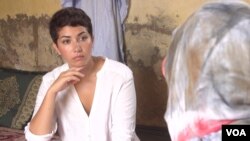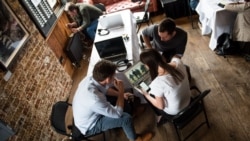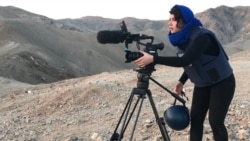“The tiniest hole in the dam can make the whole thing explode, and that's what happens with trauma,” says British-Iranian journalist Sahar Zand.
With a childhood that included being smuggled across borders as her family tried to escape political persecution, Zand thought she had developed all the coping mechanisms she would need in her career.
The award-winning journalist has worked on stories in some of the most dangerous countries in the world, including Afghanistan where, on assignment in 2015, she witnessed a suicide attack.
Despite feeling fear initially, Zand says she didn’t think she would be affected in the long-term.
“It wasn't until I came back and we were toward the end of post-production that suddenly I couldn't sleep. I couldn't wake up. I couldn't concentrate. I kept having fights. I never fight,” Zand told VOA. When an editor at the BBC asked if she was okay, she burst into tears.
As a freelancer Zand had limited options for help, and in a profession that values strength and fearlessness, she said that it can be challenging to express vulnerability.
“As a freelancer, you have to constantly be selling yourself, constantly be marketing yourself,” she said. “But, if the ‘product’ you're selling is this fearless person that just goes and gets the work out, and goes and tells stories the best way possible, no matter where, no matter how, when you have to acknowledge its weaknesses, suddenly you can't sell it as well.”
The Rory Peck Trust, though, is working to address this issue. The London-based freelance support network is offering a resilience program and fund to ensure that journalists like Zand have access to the help they need.
With grant money donated by the Facebook Journalism Project, the Rory Peck Trust has partnered with Dart Centre Europe to provide workshops on trauma and resiliency.
The virtual workshops — offered in five languages — are taught by journalists and clinicians trained through Dart Centre Europe, a regional extension of the Columbia Journalism School’s Dart Center for Journalism and Trauma in New York City.
The center’s mission is to educate journalists about trauma and how to report on those affected by violence “with sensitivity, dignity, and respect.”
The sessions will include a basic understanding of trauma including its physical effects and how it can affect storytelling, as well as guidance on interviewing those in vulnerable situations, and strategies that freelancers can use to build resiliency by caring for themselves and each other.
A separate Trauma Therapy Fund will provide financial assistance to freelance journalists seeking therapy.
Clothilde Redfern, director of the Rory Peck Trust, told VOA the organization has seen an increase in requests for help in this area.
While the pandemic has led to more open conversations about emotional health and well-being, Redfern said journalists have been at an increased risk for exposure to trauma for years.
“Due to an increased hostility toward journalists, the front line, as it were, is no longer only the physical war zone of a conflict,” Redfern said. “That has made it an increasingly dangerous and possibly traumatic occupation.”
Freelancers are particularly vulnerable because they often lack institutional support, such as access to therapy, lawyers, security advisers, and regular editors and managers to oversee their work, and ensure they aren’t taking on too much or taking unnecessary risks, says Redfern.
Zand said that staff journalists have a different experience.
“When you're not a freelancer, there is a boss, there is someone who knows your history, who cares about you, who has a bond with you as a person, not just as a product,” Zand told VOA. “Whereas, as a freelancer you don't have that. You are selling a product, that product is you.”
Without regular colleagues who can notice changes and signs of distress, health concerns can go unchecked. Teaching freelance journalists to recognize the signals is one of the main goals of the resilience program.
“Exposure to immediate trauma or stress, listening to stories, as well as a sudden atrocity, it seeps into us like a smoker,” says Angelina Fusco, chair of Dart Centre Europe. “It can go in and stay in your memory, the smell can stay in your nose, and the mental distress can also move across into your own body. It's important for journalists to recognize that. All the other emergency services recognize it and have procedures and processes to deal with it, but journalists don't.”
Fusco, who is from Belfast, lived through and reported for the BBC on the Troubles — a decades-long conflict in Northern Ireland that killed and injured thousands.
But she says she didn’t hear the words trauma and journalism used in the same sentence until the early 2000s.
After seeing a colleague transformed by trauma awareness training, Fusco applied for and was awarded an Ochberg Fellowship in 2012 through the Dart Centre Europe. She now leads training sessions for the organization.
For Zand, access to private therapy — funded in part by the Rory Peck Trust — was life changing for her and her work.
“Our work is about giving a platform to the voices that wouldn’t otherwise be heard. We have to be emotionally intelligent. We have to have good human relations. If we are unaware, and we don’t have the tools to deal with and identify our own issues, how can we do that with others? How can we really understand them as humans?” she asked.
The resilience program hopes to fill in some of the gaps in understanding and knowledge of trauma that freelancers and other journalists face.
“I genuinely believe that awareness of this topic — journalism and trauma and resilience — really improves storytelling and it improves the craft,” Fusco told VOA. “It keeps you grounded, it helps you to be impartial, and it helps you to write better stories.”






